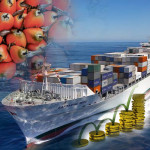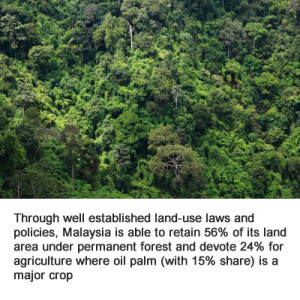Malaysian Palm Oil and the EU: Is the EU Serious About Trade?
EU Trade Commissioner Cecilia Malmström visited Kuala Lumpur last month as part of the ASEAN Summit.
Part of her mission, it seemed, was to revitalize the stalled trade talks for the Malaysia EU Free Trade Agreement (MEUFTA).
But the question that needs to be asked in response to her visit is this: how serious the EU is about trade – and trade in the region?
While the trade arm European Commission itself is no doubt keen on trade, the various political machines within the EU appear to be doing everything they can to undermine it.
Malmstrom highlighted the Singapore-EU FTA as an example, yet our understanding is that ratification has been hamstrung by the European Court of Justice.
The EU’s current big trade showpiece – a trade agreement with the US – is drifting and unlikely to be concluded within the decade.
Undermining the TTIP in particular is European politics, itself driven by various interests in manufacturing and agriculture.
Malaysia’s trade agreement hasn’t been immune to this, and nor has the EU’s proposed agreement with ASEAN.
While Malmstrom said during her visit that the EU is looking to build an ASEAN-wide agreement with what it already has in place, this is questionable given that its current agreements are hamstrung. And the likelihood of reaching agreement with a partner like Indonesia, for example, is slim at best.
The stalling of MEUFTA
Malaysia’s negotiations with the European Union on a free trade agreement (the MEUFTA) have been ongoing since 2010. They stalled during the election in 2012, but were given a new lease on life at the end of 2014, when the Prime Minister put forward a new mandate for the negotiations at an EU-ASEAN business forum.
Malaysia has already established trade agreements with Japan, Australia, India, Pakistan, New Zealand and Chile.
The EU was generally reluctant to push for trade liberalization until around 2007, when it commenced pursuit of an EU-ASEAN FTA. Presumably this was following China’s successful execution of a trade agreement with ASEAN that was ratified in 2008.
Not long after, the EU shelved its ASEAN plans, mostly due to the intractability of human rights and labor rights requirements in its FTAs, combined with countries such as Myanmar that would struggle to meet the benchmarks.
It then went after two agreements, one with Singapore and one with Malaysia. Singapore was straightforward: it is already an open, services-based economy with no agriculture and relatively little manufacturing.
Malaysia, on the other hand, has a vibrant manufacturing and industrials sector and one agricultural product that competes head to head with European farmers: palm oil.
There was a general agreement that the MEUFTA talks would be restarted during Malmstrom’s visit, but palm oil is one issue that needs addressing.
Palm oil, labels and MEUFTA
So where does palm oil sit for Malmstrom?
During her visit she stated that the various European campaigns against palm oil were being driven by consumer concerns, yet her grasp of the situation is questionable at best.
The use of labels by some European retailers in France and Belgium that are aimed at reducing palm oil consumption have serious implications for the trade relationship more broadly.
The key actors here are non-palm oil vegetable oil producers, environmental campaigners and certain retailers placing labels on some foodstuffs in France and Belgium bearing the message ‘No Palm Oil’ or ‘Palm Oil Free’.
A report commissioned by MPOC by the prestigious international law firm, Hogan Lovells, concluded these labels contravene EU laws, particularly the new EU Food Information to Consumers Regulation (1169/2011). This came into force in December 2014, and applies to all EU Member States, including France and Belgium.
Under these and other EU rules, food labelling claims for nutrition or health must have scientific justification. These rules provide coverage for these claims to be implied as well as direct. For example, the claim ‘No Preservatives’ implies preservatives have a negative health impact.
Currently, the proponents of the labels are attempting to justify ‘No Palm Oil’ labels on health grounds. There is, however, no scientific basis for this case.
There has been a lack of implementation and enforcement of the regulations, particularly in Belgium. Belgian Government Ministries and the regulatory authorities responsible have not enforced the law, and have not pursued those companies that are using and promoting the anti-palm oil labels.
This lack of implementation can also be seen in France. In 2012, it took a lawsuit by a group of exporters from the Ivory Coast suing French supermarket chain Systeme U to get some political and public attention. The farmers won the lawsuit after arguing that the campaign — which claimed palm oil had a negative effect on the environment — lacked credible ecological data and scientific analysis. The anti-palm oil advertising was withdrawn on the orders of the court.
In other words, we have a situation where EU member states aren’t enforcing their own laws.
The question then is whether a trade negotiation can be conducted in good faith.
Renewable energy
Similarly Malmstrom stated during her visit that “sustainable sources of energy” were part of the EU Renewable Energy Directive (RED).
But the trade problems around the RED have been disturbing for anyone attempting to export to the EU.
This has been a particularly contentious policy for exporters of renewable feedstocks for fuels to the EU. The policy effectively subsidised renewable energy producers by mandating that a percentage of the EU’s energy supply had to come from renewable sources.
The possibility that renewable fuels might be imported — and competitively — wasn’t necessarily a scenario envisioned by EU policymakers. But the competitiveness of soy- and palm-based fuels effectively meant that the subsidy would go to non-European producers.
This resulted in Europe introducing arbitrary environmental criteria to prevent access to this subsidised market by imports. In other words, trade discrimination.
Argentina brought a complaint against the EU over the policy which is highly likely to breach WTO rules. Malaysia and Indonesia have both expressed concerns in the WTO.
Where do we go?
So does this mean MEUFTA remains at a standstill?
Probably not, but there does appear to be an impasse.
The EU is trying to get larger trade deals under its belt. Its priority is a trade agreement with the US. It is still seeking an ASEAN FTA — hence the need for cooperation agreements with ASEAN member states.
This is a very European approach: slow, unwieldy, bureaucratic. Contrast this with the dynamism of the US-backed Trans Pacific Partnership Agreement, which has gone from almost nothing to being near completion within four years.
But on the MEUFTA question and the broader trade relationship, Malaysia needs assurances from the EU that the trade relationship is important, and that the EU considers Malaysia an equal trading partner, particularly as it is chairing ASEAN this year.
ASEAN’s population is more than 600 million.
Some observers of the palm oil trade had hoped that MEUFTA would provide a magic bullet solution that would address many of the policy problems facing palm oil.
But if Malaysia has to wait for the EU and its negotiations with ASEAN member states to be concluded, these policies will require a piecemeal approach.
Malaysia can, for example, consider launching its own dispute resolution case in relation to the EU-RED, just as Argentina has done.
Malaysia’s negotiations with the EU over the FLEGT timber programme are ongoing; a working committee could be established to look at the possibility of introducing a VPA on other commodities. Similarly, the EU has launched consultations into broader FLEGT arrangements — and Malaysia should participate in this.
Labelling, however, presents a more immediate challenge in that while it is not a policy, its continued protection by governments of Belgium and France represents a state-sponsored endorsement of the actions by these private companies. Alongside affected exporters, the government needs to use diplomatic channels within those jurisdictions accordingly. Similarly, the EU needs to ensure that they attempt to enforce the law and not be seen as subject to politicisation.
Should Malaysia raise these issues in future negotiations and demand answers?
Absolutely.
Malaysia — and the rest of ASEAN — needs to remind the EU that: first, trade is a two-way relationship; second, that its imperial influence has long faded; third, its protectionist tendencies will not cut it in a globalised, post-colonial world.










Leave a Reply